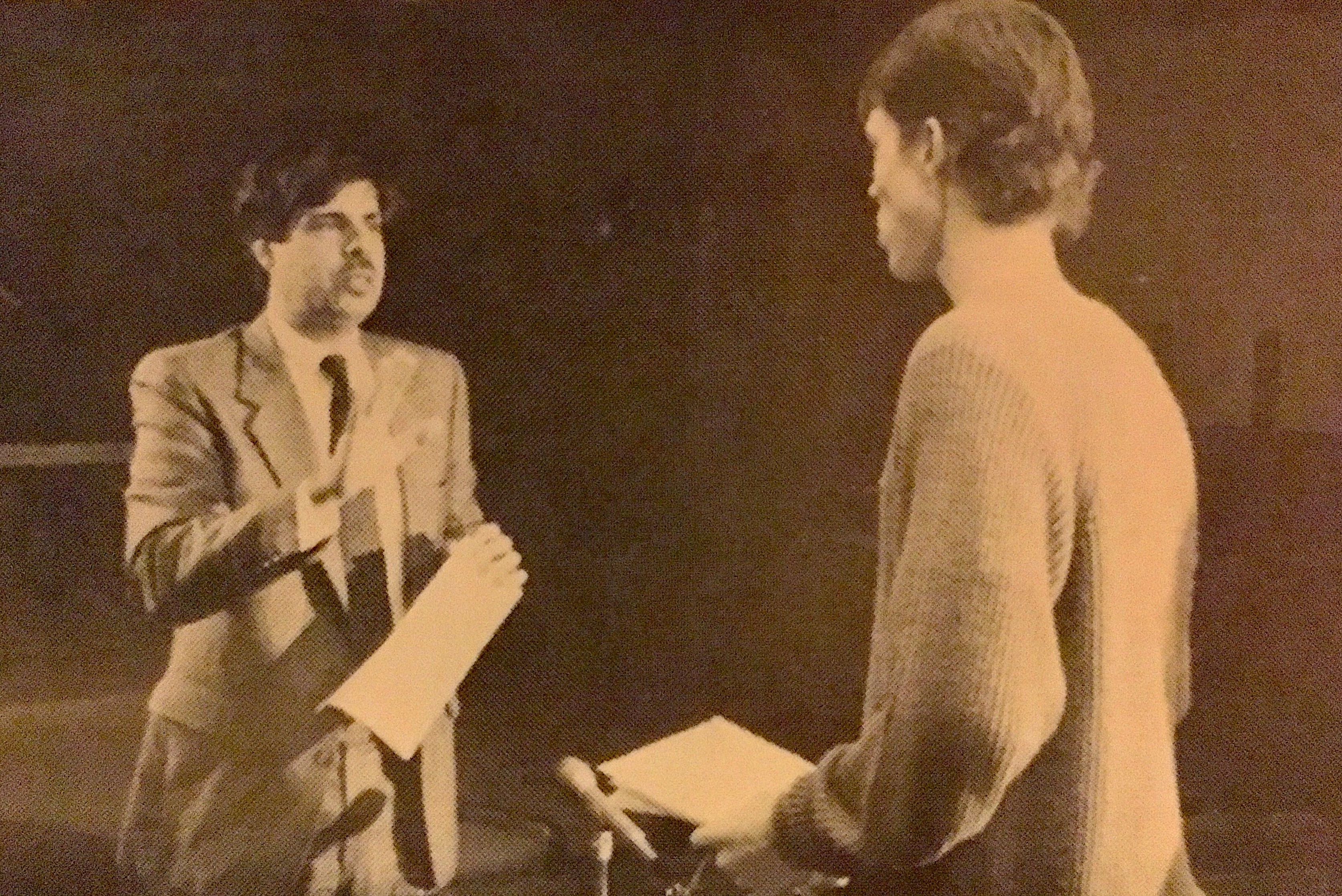1) Bringing a list of questions isn’t essential
When it comes to interviews, I very rarely turn up with a list of questions. Almost never, in fact. If you’ve prepared well, and know something about your subject, the conversation just happens.
–Tom Bissell, interviewed in The Rumpus, April 17, 2012
2) Let the person talk
The secret is: let the guy talk. You never know where they’re going, and it gets really interesting when you let people run on. Every once in awhile they say something that makes me want to stop them — ‘Wait! Tell me more about that!’ — but I resist the impulse, because I might lose the jewels that are about to fall from their lips. Instead, I make a mental note to go back to the topic later.”
–William Langewiesche in The New New Journalism (2005)
3) People really want to be listened to
People don’t get heard as much as they’d like. It was a great realization for me as a writer that people really want to be listened to. They are surprised that someone is interested, really interested. And you have to really want to hear somebody. A big part of it is tapping people’s natural desire to be listened to, especially since they know they’ll never have to deal with you again. It’s the same principle that underlies therapy, confession, conversations with strangers on airplanes: it’s a kind of duty-free intimacy that people really crave. If you can provide it without tricking people — because it’s not duty-free; it gets published — you can tap into that incredible appetite. It’s more appealing to talk with someone you’ll never know. It’s almost like talking out loud to yourself. And there is no limit to how unnoticed people feel by the media. It’s just the nature of what is considered newsworthy. If a person is living a life that is not newsworthy, it’s appealing to have someone say, “I want to hear your story.” Most people say, “Really, really? You really want to hear?” And people have amazing stories.
–Susan Orlean, Yale Literary Magazine interview (2002)
4) Think of interviews as conversations
My own preference is that sit-down interviews occur before you get very far into reporting. I try not to think of these as interviews but as conversations. I never have a list of questions but usually start out with, “So where were you born?” My goal is to let people simply ramble on about their personal histories and see where it goes, because you just don’t know yet what’s important. See what rises forth.
–Walt Harrington, “The Art and Craft of Reporting Everyday Life” (1997)
5) Ask really dumb questions
One way to get people to say interesting things is to ask dumb questions. I ask really dumb questions. I let people talk as long as they want. If they don’t talk, I sometimes remain silent. Silence makes people uncomfortable and people will keep talking to fill the space. Often, I’ll play devil’s advocate. When I was working on a story about a crack dealer, I spent a lot of time riding around his neighborhood with him. We passed some people who looked homeless. To test him, I said, ‘Gee, look at those people. Why don’t they clean themselves up?’ He became very angry, telling me, ‘You’re not better than those people!’ After that he became sad. Little by little the true story of his circumstances came out. Making people angry is a good way to tell the truth. I’m willing to be yelled at or disliked in the interest of the story. The real story, framed accurately and rendered honestly, is what counts.”
–Debra Dickerson in Telling True Stories (2007)
6) Let the subject help you into an understanding
If doing nothing can produce a useful reaction, so can the appearance of being dumb. You can develop a distinct advantage by waxing slow of wit. Evidently, you need help. Who is there to help you but the person who is answering your questions? The result is the opposite of the total shutdown that might have occurred if you had come on glib and omniscient. If you don’t seem to get something, the subject will probably help you get it. If you are listening to speech and at the same time envisioning it in print, you can ask your question again, and again, until the repeated reply will be clear in print. Who is going to care if you seem dumber than a cardboard box? Reporters call that creative bumbling.
–John McPhee, “Elicitation,” The New Yorker, April 7, 2014
7) Be honest with your subject up front
Any interview I do for a narrative story, particularly with people who don’t speak to reporters normally, I usually have a preamble where I talk about the questions I’m going to ask. I tell them, A story like this relies on details, I’m going to ask you what might seem like some really strange questions. If you don’t remember, that’s okay, don’t force yourself to remember things; don’t think anything’s stupid, if I ask a question you don’t like, tell me you don’t like it.
–Chris Jones, Nieman Storyboard interview, December 1, 2011
8) Personal stories are better than answered questions
If the person we’re going to be talking to is what we call a kind of “normal person,” they may be reluctant, they may be shy, they may be reticent to reveal too much. If I say, “What I’d like to leave the audience with is an idea of what your life is like right now,” then they will start telling me the information I need in the form of a story. Then I become the person who teases them along and directs them in terms of questions, who fleshes it out. They become much more relaxed, so they’re going to make it more of a narrative. They’re not on edge, thinking that I’m going to ask them a question they can’t answer or that’s beyond them. They know that what I want is just a personal tale. It’s much easier to elicit from somebody when you give them a heads up that it’s not a gotcha interview.
–Lisa Mullins interviewed in Nieman Storyboard, December 17, 2010
9) Interrupt if necessary to keep things conversational
On the other hand, if it is a gotcha interview, if it’s a government representative, you can plan for the narrative, but it’s easiest in the execution when you can get the subject disarmed enough to just have a conversation. Sometimes that means interrupting a bit. Sometimes that means saying, “Hold on, I want to ask you about that in a few minutes, but let’s get back to this other point.” Then people will speak more naturally to you. They’re not going to talk sound bites. When they’ve practiced or repeated so much of what they have to say that they’re speaking on automatic pilot, that detracts from the interview. When I can get them speaking in terms of chronology, in terms of a thought process, in terms of watching a story unfold and then maybe bringing it back to the beginning, that’s when the audience is naturally going to listen. People have an ear for storytelling, and everybody wants to hear a good story.
–Lisa Mullins interviewed in Nieman Storyboard, December 17, 2010
10) Remind the subject that you can’t tell their whole story
Throughout the process of reporting I tell people, ‘It’s my story.’ I often tell them, ‘Imagine I’m making a movie of your life. I have to trail you around with a camera because I’m trying to show people nothing but your life. I have to see your bedroom, meet your friends, and see how you are with your mom. I’m going to watch you, and I’m going to see it differently from the way you do. I’ll talk to other people about you. I’ll be here for a while, and then I’m going to disappear and write my story about your life. It won’t be the story of your life. It will be one tiny piece of what we’ve talked about. You will tell me one thousand things, and to of them will end up in the story.’ Ethically and logistically, it is important that your subjects understand the dynamic as much as they can.
–Adrian Nicole LeBlanc in Telling True Stories (2007)
11) If in doubt, be temperamentally unobtrusive
I am bad at interviewing people. I avoid situations in which I have to talk to anyone’s press agent. (This precludes doing pieces on most actors, a bonus in itself.) I do not like to make telephone calls, and would not like to count the mornings I have sat on some Best Western motel bed somewhere and tried to force myself to put through the call to the assistant district attorney. My only advantage as a reporter is that I am so physically small, so temperamentally unobtrusive, and so neurotically inarticulate that people tend to forget that my presence runs counter to their best interests. And it always does. That is one last thing to remember: writers are always selling somebody out.”
–Joan Didion, Slouching Towards Bethlehem (1968)
12) Do some advance homework on your interview subject
Never go into an interview without doing whatever homework you can. If you are interviewing a town official, know his voting record. If it’s an actor, know what play he has been in. You will be resented if you inquire about fact that you could have learned in advance.
–William Zinsser, On Writing Well (1976)
13) Master the art of hanging out
What people say isn’t necessarily what they really believe. And what they say to you today isn’t what they are going to say to you later on — when you know them well. In the beginning, the interview is all but meaningless. All I’m trying to do is see people in their setting. Language isn’t even all that important when I’m reporting a story in a country where I can speak it. …The reporting I do is more visual than verbal. My reporting is less about talking to people than what I’ve called “the fine art of hanging out.”
–Gay Talese in The New New Journalism (2005)





